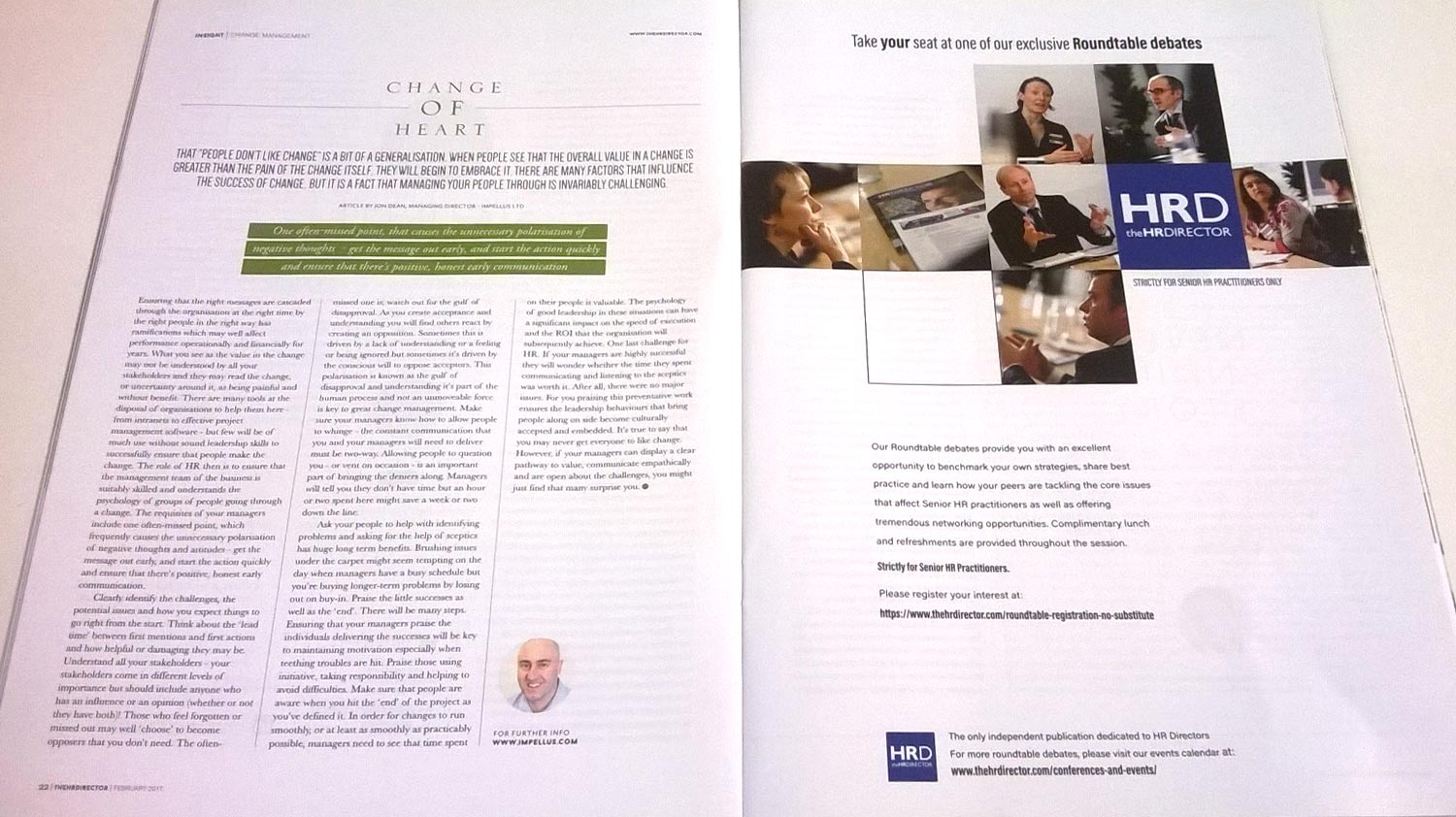That “People don’t like change” is a bit of a generalisation. When people see that the overall value in a change is greater than the pain of the change itself, they will begin to embrace it. There are many factors that influence the success of change, but it is a fact that managing your people through is invariably challenging.
One often-missed point, that causes the unnecessary polarisation of negative thoughts – get the message out early, and start the action quickly and ensure that there’s positive, honest early communication
Ensuring that the right messages are cascaded through the organisation at the right time by the right people in the right way has ramifications which may well affect performance operationally and financially for years. What you see as the value in the change may not be understood by all your stakeholders and they may read the change, or uncertainty around it, as being painful and without benefit. There are many tools at the disposal of organisations to help them here – from intranets to effective project management software – but few will be of much use without sound leadership skills to successfully ensure that people make the change. The role of HR then is to ensure that the management team of the business is suitably skilled and understands the psychology of groups of people going through a change. The requisites of your managers include one often-missed point, which frequently causes the unnecessary polarisation of negative thoughts and attitudes – get the message out early, and start the action quickly and ensure that there’s positive, honest early communication.
Clearly identify the challenges, the potential issues and how you expect things to go right from the start. Think about the ‘lead time’ between first mentions and first actions and how helpful or damaging they may be. Understand all your stakeholders – your stakeholders come in different levels of importance but should include anyone who has an influence or an opinion (whether or not they have both)! Those who feel forgotten or missed out may well ‘choose’ to become opposers that you don’t need. The often-missed one; watch out for the gulf of disapproval. As you create acceptance and understanding you will find others react by creating an opposition. Sometimes this is driven by a lack of understanding or a feeling or being ignored but sometimes it’s driven by the conscious will to oppose acceptors. This polarisation is known as the gulf of disapproval and understanding it’s part of the human process and not an unmoveable force is key to great change management. Make sure your managers know how to allow people to whinge – the constant communication that you and your managers will need to deliver must be two-way. Allowing people to question you – or vent on occasion – is an important part of bringing the deniers along. Managers will tell you they don’t have time but an hour or two spent here might save a week or two down the line.
Ask your people to help with identifying problems and asking for the help of sceptics has huge long term benefits. Brushing issues under the carpet might seem tempting on the day when managers have a busy schedule but you’re buying longer-term problems by losing out on buy-in. Praise the little successes as well as the ‘end’. There will be many steps. Ensuring that your managers praise the individuals delivering the successes will be key to maintaining motivation especially when teething troubles are hit. Praise those using initiative, taking responsibility and helping to avoid difficulties. Make sure that people are aware when you hit the ‘end’ of the project as you’ve defined it. In order for changes to run smoothly, or at least as smoothly as practicably possible, managers need to see that time spent on their people is valuable. The psychology of good leadership in these situations can have a significant impact on the speed of execution and the ROI that the organisation will subsequently achieve.
One last challenge for HR. If your managers are highly successful they will wonder whether the time they spent communicating and listening to the sceptics was worth it. After all, there were no major issues. For you praising this preventative work ensures the leadership behaviours that bring people along on side become culturally accepted and embedded. It’s true to say that you may never get everyone to like change. However, if your managers can display a clear pathway to value, communicate empathically and are open about the challenges, you might just find that many surprise you.
Change of Heart article by Jon Dean as it appeared in HR Director, February 2017
























